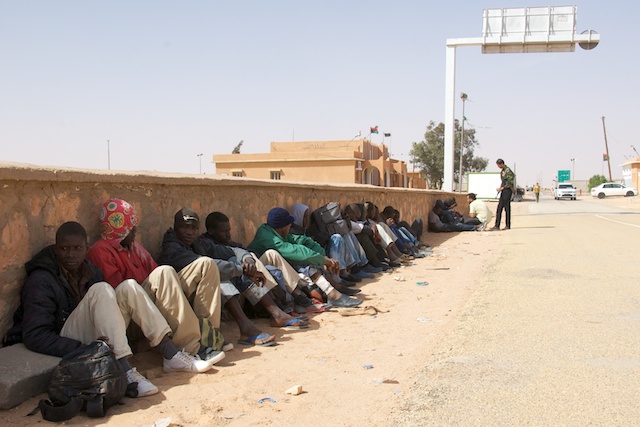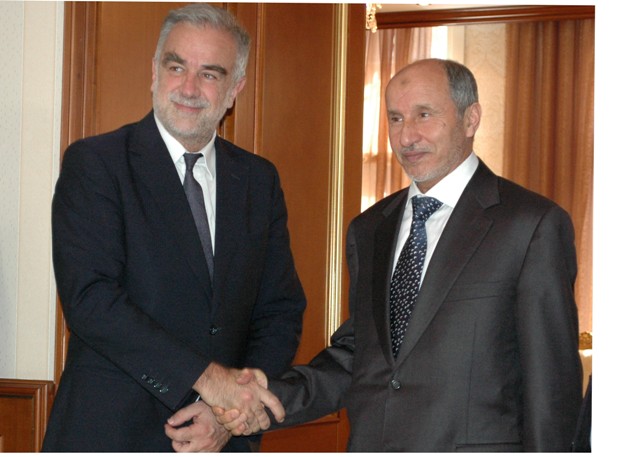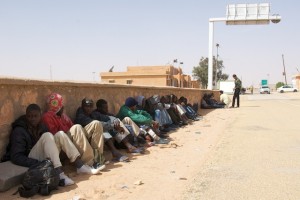
By Marcus Rhinelander.
Tripoli, 18 April:
The town of Ghadames sits at the junction of three countries – Libya, Algeria, and Tunisia – and is an oasis in the desert waste. Not surprisingly, it has always been a magnet for illegal immigrants to Libya. A recent visit to the town showed that the problem continues, with dozens of Africans crossing the border illegally each week. And along with illegal immigration, human rights violations are occurring, supposedly by the police themselves.
Last Friday, seventeen African migrants squatted along a low wall, hiding from the sun in the no-man’s land between the Libyan and Algerian posts. That morning, they’d been driven to the border by police in Ghadames and told to leave. But the Algerian border guards wouldn’t let them enter Algeria, so they waited, sitting in the mid-day sun in the legal and geographical limbo of no-man’s land.
Inside one of the rooms of a trailer at the crossing, along with two Arabs who didn’t want their pictures taken and claimed they didn’t speak French, sat Djedje Keita, from Bemera, Bamako, Mali. He spoke French and the others listened. He’d been in Libya three days, a 25-day journey from home. It cost him 100,000 Malian francs – $200 – for the trip. He’d spent 4 months in Mauritania working as a fisherman to save the money for a three-day trip across Algeria in a Landcruiser. “I worked in Libya for two years, from 2008 to 2010, in Tripoli, slaughtering chickens. Yes, it was good money, 350 dinars a month. No, there’s no work like that at home. Before things went well and there was no problem.”
This time, he was arrested by the police here in town. After several days in jail, “they brought us here and said nothing. Just ‘Go.’ That’s it. Yes, many people in my village have left. Many people. And many more want to come.”
Outside, in the sun sat Orissa Tounkara, from Tinkare, Mali, a village of 760 people. A solid man with a shaved head, he looked older than his companions. He left home three months ago, paid 35,000 Malian francs ($70) and then 19,000 Algerian dinars ($250) to cross the desert, money he’d worked for two years to save. His father is a digger for diamonds in Sierra Leone. “No, I don’t want that job! Any job, but not that job,” he said. “In the villages there are no jobs. Everybody goes abroad – that is the job!”
Asked if he was trying to get to Europe, he replied, “I want to stay and work in Libya. There’s no chance to go to Europe. If Europe’s not possible, then Libya is good.” When he was arrested here, the police told him that it was “time to forget about this country. We have a war. It’s no good.” Asked what was next, he said, “In the night, we will walk to the lights of the village in Algeria. I will not return. They beat people here every day. Not me, but many others.”
Daniel Ofori, 30, was one of those beaten. From Ghana, he is no stranger to Libya, having lived in Tripoli for three years. But, he said, “after the revolution, people came and took everything I had, even my passport.” His embassy gave him a Ghanian ID card and he went home.
Last week he returned illegally, arriving in Ghadames on Monday, and getting caught by the police soon after. The police refused to recognise the ID card issued by the Ghanian embassy in Tripoli, and, he says, beat him severely for protesting. When asked, Daniel took off his hoodie and shirt to show his upper arms and back, covered with scabs and welts. Standing in the hot sun, looking at his beaten back, it was hard not to think of the slave trade. “I was beaten every day. For no reason. Beaten with sticks, with hands, with electric wire. The police here are no good.”
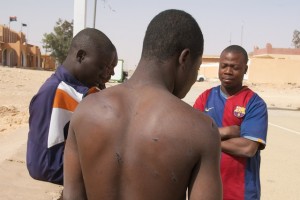
Abdul Razzak Moumony, also from Ghana, “came because we had no money to buy food. No job is OK; no food is no good.” He says he was imprisoned in Ghadames for a week, then, “the police came and said ‘Go’. Yes, we were beaten! I was beaten.” And, he pointed to the man squatting next to him, “This man was hit in the ears, and still cannot hear.”
The police in Ghadames are widely reviled, and not just by migrants. Several people I talked to in Ghadames refused to make any comment on the record. But unofficially, they are scathing. “The police here do nothing. Worse than nothing. They take anything they can.” The most common response to any questions about the police was “Klifty, Klifty,” — slang for “stealing”.
In contrast to the local police, security at the border and around key points in Ghadames is provided by militia from Jadu, 300 kilometres away in the Jebel Nafusa and they were widely praised for their honesty. “No, no one here [at the border] has been bad to us,” said Daniel Ofori. “They just told us to wait until the Algerians let us cross.”
This sentiment is widely shared. The same people from Ghadames who talked about the police, when asked about the Jadu qatiba, said, “Oh, they are very different! They don’t take anything from anyone. They don’t even get paid! They should get paid. But for now they work for free, for the new Libya.”
Mohammad Ibrahim Jeblani, a local Tuareg elder, agreed: “The relationship between the Tuareg and Jadu is good. During the difficulties, most of the Jadu people helped the Tuareg from Ghadames communicate with the NTC. When the situation first developed, Jadu came to protect the Tuareg. And everyone else.”
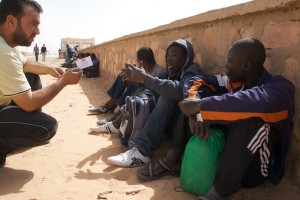
Perhaps surprisingly, none of the migrants interviewed reported any bad experiences with the smugglers who transported them across the desert. According to Abdul Moumony, “The people we paid were just trying to help us enter Libya. They collect money and then direct you on your way.” None of the men reported being robbed or cheated. And none reported any problems with border control or authorities from the time they left their homes until their arrival in Libya. The first time any of them said they’d been stopped – and the first time they claimed to have been robbed or beaten – was by the police in Ghadames.
The exact number of people crossing the border is impossible to know. But according to Al Faqe Moussa, a Tuareg liason with the NTC who lives in Ghadames, “every day, maybe 20 people cross the border near here. It’s only ten kilometres by foot from Deb Deb in Algeria. People give money to Algerians for the crossing, then stay in Ghadames for four or five days before going to Tripoli and on to Italy.”
Abdul Moumony said that the smugglers who took him “were Algerian, from inside the town, not Tuareg.” Others migrants interviewed in Ghadames said the same thing. Al Faqe Moussa admitted that some Tuareg were involved in the trade as well: “I open my heart to you. We are working in this. If you have no salaries, what can you do?” But he insisted that his fellow Tuareg would be happy to help control the border if they were paid and given the support they needed to do the job.
“Libya and Algeria would like to control the border, but they bring soldiers from Tripoli to the desert. They have no idea about the desert, the routes, the situation,” he said. “These people from outside don’t care about the people here. They can’t control the area. There are many families in south Libya: Tuareg, Arab, Tebu. For me, all these people together should control the border. The government should send the equipment and support the people here to work here.”
He’s not the only one who thinks that a reformed border force is necessary. Last week delegations from the US and British embassies drove to Ghadames to discuss the issue with the local council and others in the community. When asked about their visit, one member of the US delegation said, “We came to meet the local council and discuss some things.”
When pressed for specifics, he replied “We’re just here to talk about the general situation.” Sources at the meeting, however, said that the focus was on border security in the unstable environment of North Africa.
The American government is, supposedly, worried about the Tuareg rebellion in Mali and fears that the weapons, many of them from Libya, which have fueled that conflict may now add to the growing strength of Ansar Deen, the Islamist faction affiliated with Al-Qaeda in the Islamic Maghreb (AQIM).
The British are concerned with illegal immigration, especially given Libya’s status as a way-station for migrants seeking to cross to Europe. These countries, along with the European Union and its member states, have an interest in helping Libya patrol its borders effectively. For now, however, hundreds — perhaps thousands — of illegal immigrants continue to cross into Libya every month looking for a better life.
Despite the costs, hazards and abuse, they will continue to come.
Tweet
[/restrict]


